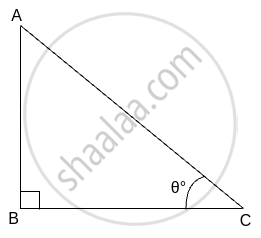Advertisements
Advertisements
प्रश्न
`sec theta (1- sin theta )( sec theta + tan theta )=1`
उत्तर
LHS = `sec theta ( 1- sin theta )(sec theta + tan theta)`
=` (sec theta - sec theta sin theta) ( sec theta + tan theta)`
=` (sec theta - 1/(cos theta) xx sin theta )(sec theta+tantheta)`
=` (sec theta - tan theta ) ( sec theta + tan theta)`
= `sec ^2 theta - tan ^2 theta`
= 1
= RHS
APPEARS IN
संबंधित प्रश्न
Prove the following trigonometric identities.
`((1 + tan^2 theta)cot theta)/(cosec^2 theta) = tan theta`
If tan A = n tan B and sin A = m sin B, prove that:
`cos^2A = (m^2 - 1)/(n^2 - 1)`
`cot^2 theta - 1/(sin^2 theta ) = -1`a
`(tan^2theta)/((1+ tan^2 theta))+ cot^2 theta/((1+ cot^2 theta))=1`
` (sin theta + cos theta )/(sin theta - cos theta ) + ( sin theta - cos theta )/( sin theta + cos theta) = 2/ ((1- 2 cos^2 theta))`
If sin2 θ cos2 θ (1 + tan2 θ) (1 + cot2 θ) = λ, then find the value of λ.
Prove the following identity :
`sinθ(1 + tanθ) + cosθ(1 +cotθ) = secθ + cosecθ`
Prove the following identity :
secA(1 + sinA)(secA - tanA) = 1
Prove the following identity :
`cosA/(1 - tanA) + sinA/(1 - cotA) = sinA + cosA`
Prove the following identity :
`(1 + cosA)/(1 - cosA) = (cosecA + cotA)^2`
Prove the following identity :
`sqrt(cosec^2q - 1) = "cosq cosecq"`
Prove that:
tan (55° + x) = cot (35° – x)
Prove the following identities:
`1/(sin θ + cos θ) + 1/(sin θ - cos θ) = (2sin θ)/(1 - 2 cos^2 θ)`.
If 3 sin θ = 4 cos θ, then sec θ = ?
Prove that `(1 + sintheta)/(1 - sin theta)` = (sec θ + tan θ)2
Prove that `(1 + sin "B")/"cos B" + "cos B"/(1 + sin "B")` = 2 sec B
If cos A + cos2A = 1, then sin2A + sin4 A = ?
Show that, cotθ + tanθ = cosecθ × secθ
Solution :
L.H.S. = cotθ + tanθ
= `cosθ/sinθ + sinθ/cosθ`
= `(square + square)/(sinθ xx cosθ)`
= `1/(sinθ xx cosθ)` ............... `square`
= `1/sinθ xx 1/square`
= cosecθ × secθ
L.H.S. = R.H.S
∴ cotθ + tanθ = cosecθ × secθ
Find the value of sin2θ + cos2θ

Solution:
In Δ ABC, ∠ABC = 90°, ∠C = θ°
AB2 + BC2 = `square` .....(Pythagoras theorem)
Divide both sides by AC2
`"AB"^2/"AC"^2 + "BC"^2/"AC"^2 = "AC"^2/"AC"^2`
∴ `("AB"^2/"AC"^2) + ("BC"^2/"AC"^2) = 1`
But `"AB"/"AC" = square and "BC"/"AC" = square`
∴ `sin^2 theta + cos^2 theta = square`
Statement 1: sin2θ + cos2θ = 1
Statement 2: cosec2θ + cot2θ = 1
Which of the following is valid?
